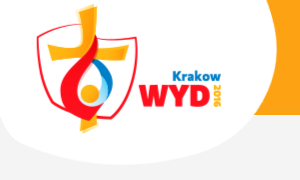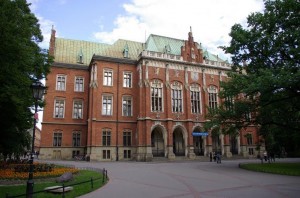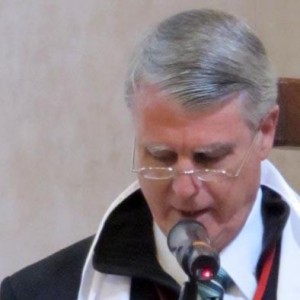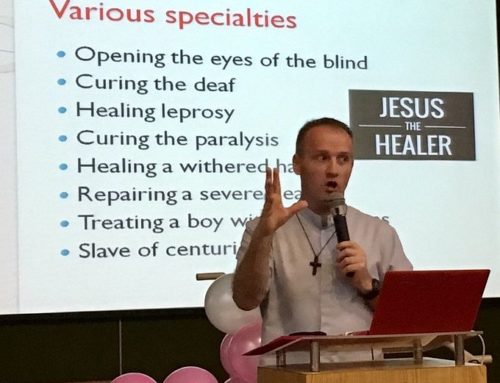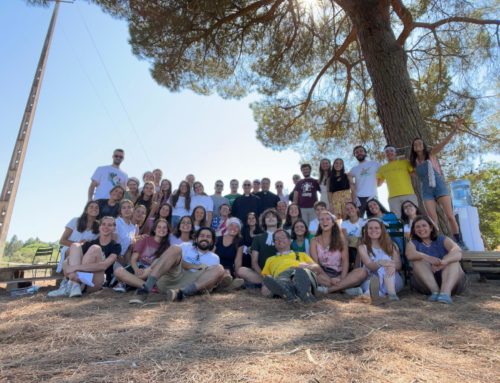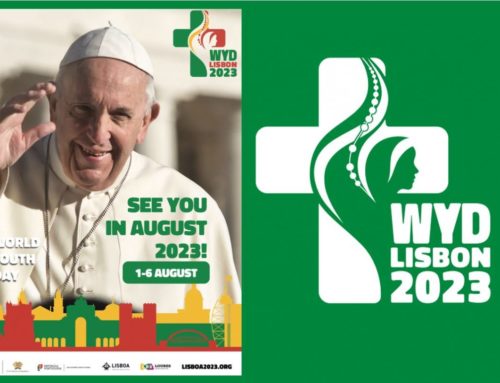“I was sick and you visited Me.” Mt 25, 36b
Medical students and young doctors from around the world have an appointment in July in Krakow, during the 31st World Youth Day. The International Federation of Catholic Medical Associations (FIAMC) promotes a seminar entitled: “I was sick and you visited me” on July 27th (Wedesday).
The meeting will take place at the Collegium Novum from the Jagiellonian University between 2 and 4 pm. In this meeting students and young professionals will reflect on the role of mercy in the lives of health professionals and will be able to exchange experiences with colleagues from around the globe.
Adress: Uj Collegium Novum, Gołębia 24, 33-332, Kraków
https://www.facebook.com/events/1112973952109322/
http://worldyouthday.com/krakow-2016
……………
Welcome to the young doctors and medical students attending the FIAMC session at the WYD conference.
Where: Collegium Novum, Jagiellonian University, Krakow
When: Wednesday, July 27th from 2pm-4pm
Who: Young Doctors and Medical Students
On behalf of the FIAMC I welcome you to this session for young doctors and medical students. We thank the WYD staff for providing us with this opportunity and for Dr. Spineti and the people who helped him organize this meeting.
One of the ancient traditions in medicine is the obligation that physicians have to care for those who are studying to become physicians. It is an expectation likened to a kind of fatherhood (and its equivalent motherhood) who is concerned not just with passing along knowledge of the science of medicine and its art, but of a love and respect for all patients—for all human life. Medicine is not simply a technical understanding of the science of the body but an appreciation for the human person—body, soul and spirit—and all at the same time. Biology is of the utmost importance, but biography is essential. The human body gives shape to a visible person, but the invisible animates and gives life to that body.
The physician is responsible for passing on this kind of understanding of his profession—caring for the whole person—to the medical student. His patients will be not only corporeal persons, but transcendent as well.
From antiquity there has been a relationship between the physician and his art, and God. The physician is given an understanding of the wisdom God has made known through His creation. To practice this art without gratitude to God for allowing man to understand the order of things in creation and how to use it and care for it is to work impaired. This honest appreciation for the nature of creation and our capacity to understand it is the beginning of humility which opens God’s wisdom to mankind.
When medicine practices its science without reference to God and the grace He provides, a grace which allows men to see the inherent good of each person as a unique creation of God, therefore possessing a right to be respected and a life that obliges the physician to care for its well-being, it falls prey to a relativism of usefulness. Objects are useful or not; the human person is a subject and does not lose his or her worth when they are no longer able to provide a “useful” function in society.
It is crucial, then, that the physician have a real experiential relationship with God—with God who has revealed Himself most fully in Jesus Christ. For this relationship will be the foundation for a faith which will grow as this personal relationship grows in the individual’s prayer and in his or her fidelity to the Church and the Scriptures. So what does the elder physician have to offer the young physician? First of all, his or her prayers. He/she should pray for the young physicians in the quiet of his/her own heart; while laying his hands on the young doctor and asking the Holy Spirit to pour out His graces on him /her; and by his or her example of faith in action. Secondly, the elder physician has the wisdom of faith and morals to share from the teaching of the Church and the appropriation of this body of wisdom by Catholic and Christian medical communities and associations.
As part of this obligation in love that we elder physicians have to you young doctors and medical students, we want to greet you here at this World Youth Day. This year it is being held in the homeland of St. John Paul II, one of the great defenders of the dignity of the human person. We are honored to have this opportunity to meet in this particular place with you all as you enter a profession dedicated to the care of the person who comes to you for help. In each encounter you will have an opportunity to put into action your belief in the unique dignity of the person who sits in front of you. It is not difficult to love those in need—the “poor”. It requires a wish or a prayer for their well-being and safety and maybe a financial contribution. You, however, will be blessed with the difficult task of caring for this particular “poor” person who has an immediate need—and that need you will be expected to meet yourself in that place and time. It will go better if you see your role as a mission of love rather than simply a duty. Duty requires you to provide a certain service to your patient which might feel like a heavy yoke to bear; love makes your yoke feel light and sweet; the Great Physician is who you are yoked with and He will assist you in every way to take care of this person He died to save.
We thank you for taking time to join us who are representing the FIAMC. When you return to your country, look for the nearest Catholic Medical Association. Take advantage of the social media to find Catholic medical student sites where you can contact other medical students and young doctors. We will be encouraging your elder brothers and sisters in the medical profession to aid you in your response to God’s call on your life.
God bless you all.
Kevin J. Murrell MD
FIAMC Committee for Young Doctors and Medical Students

